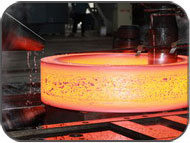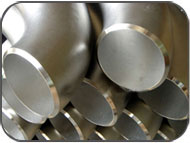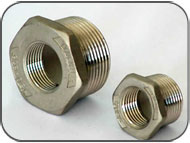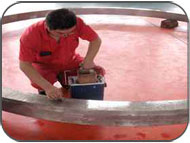Products / Nickel Alloys / Inconel / Inconel 600 Forgings
What is Inconel 600 | Inconel 600 Principal Features | Inconel 600 Strength | Inconel 600 Physical Properties | Inconel 600 Price |
→ Nickel Alloys
→ PRODUCTS
 We are industrial suppliers of Nickel Alloy 200 Products |
Please note: we may supply special diameters in small quantities at request
Inconel® is a trademarked material that is primarily composed of nickel but that also contains iron and some chromium. Inconel® forgings are extremely resistant to corrosion and additionally retain strength in elevated temperatures. Inconel®, being a nickel alloy, also has a low thermal expansion coefficient which makes it ideal for high-temperature applications. We offers metal forgings in the following types of Inconel material • INCONEL® 600 is a nickel alloy. Its forgings offer high strength and a moderate level of corrosion resistance. • INCONEL® 601, also a nickel alloy, composes forgings that resist deformation as well as stress cracking in high temperature applications. The addition of aluminum and silicon improve this alloy’s resistance to oxidation. • INCONEL® 625 forgings contain aluminum as well as titanium and are often age hardened for increased resistance to common types of metal fatigue. • INCONEL® 718 is combined with niobium for the production of forgings that retain strength during lower temperature applications. • INCONEL® 725 contains niobium, titanium, and molybdenum. Its forgings are precipitation hardened to increase strength and resist creep at higher temperatures. • INCONEL® X-750 forgings contain a higher level of chromium and demonstrate a higher level of corrosion resistance. • INCONEL® 800 forgings are composed of a basic nickel alloy that can resist oxidation and carburization at high temperatures. • INCONEL® 800 HT is alloyed with aluminum and titanium. Its forgings have a higher level of heat resistance as well as other good mechanical properties. • INCONEL® 825 forgings are often used for marine applications due to their higher titanium and molybdenum content which resists pitting, stress cracking, and corrosion. • INCONEL® 903 forgings have a low thermal expansion coefficient and provide high levels of strength in elevated temperatures.
ASTM Specifications for ForgingsProducts forged to ASTM standards meet international standards for quality, performance, and safety and, additionally, are compliant with many U.S. regulations which have incorporated or referred to ASTM standards. Contact Hexion Steel LIMITED. for forged products that meet ASTM standards. AMS Specifications for ForgingsAerospace Material Specifications (AMS) are in use worldwide to ensure quality manufacturing processes for parts and components used in aerospace applications. Hexion Steel LIMITED. supplies a variety of forged products that meet AMS specifications;call Hexion Steel LIMITED. today to learn more. U.S. Military Specifications for ForgingsDeveloped by the United States Department of Defense, military part specifications are used to ensure high quality parts for military vehicles and equipment. Private companies who supply military equipment or parts can rely on Hexion Steel LIMITED. for forged products that meet the military’s standards; contact Hexion Steel LIMITED. now to learn more. Proprietary Specifications for Custom Steel ForgingsRegardless of your company’s industry or product’s application, Hexion Steel LIMITED. supplies the custom steel forgings that meet either your internal specifications or your customer’s requirements. Hexion Steel LIMITED. can provide parts and components forged through a variety of methods, including open die forging, closed die forging, and upset forging, in virtually any material, whether alloy steel, carbon steel, titanium, etc.
open die forging Open die forging is a process where the material is not confined laterally as in closed die forging; it is instead performed between two flat dies that have no impression made in them.
Closed die forging Also called impression die forging, closed die forging uses two or more dies. Each die contains an impression of the desired shape. The metal is heated until it reaches a plastic state and is then compressed by the dies.
Upset forging Performed on bar stock, upset forging decreases the length of the stock and increases its cross-section. High pressures deform the metal and force material into a designated area of the bar. More useful informationChemical Analysis of ALLOY 600 (UNS N06600)
Size Range Alloy 600 wire, bar, rod, forging, plate, sheet, tube, fastener and other standard forms are available. Alloy 600 is a nickel-chromium alloy with excellent resistance to organic acids and is used extensively in fatty acid processing. The high nickel content of Alloy 600 provides good resistance to corrosion under reducing conditions, and its chromium content, resistance under oxidizing conditions. The alloy is virtually immune to chloride stress-corrosion cracking. It is also employed widely in the production and handling of caustic soda and alkali chemicals. Alloy 600 is also an excellent material for high-temperature applications requiring a combination of heat and corrosion resistance. The excellent performance of the alloy in hot halogen environments makes it a popular choice for organic chlorination processes. Alloy 600 also resists oxidation, carburization, and nitridation. Corrosion resistance Specifications
Nickel - Monel® - Inconel® - Incoloy® - Hastelloy® - Alloy 20 - Duplex - Olets® are the registered trademarks of their respective owners. |
|||||||||||||||||||||||||||||||||||||||||||||||||||||||||||||||||||||||||||||||||||||||||||||||||||||





